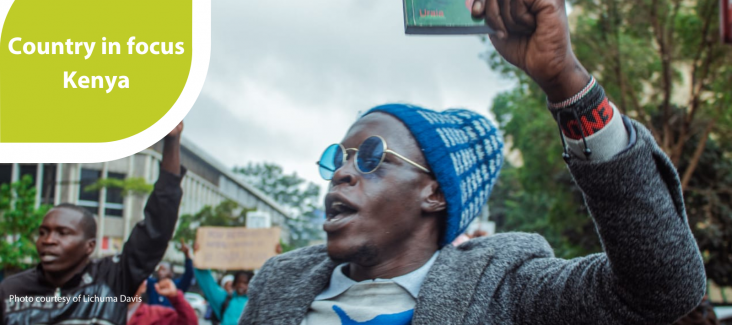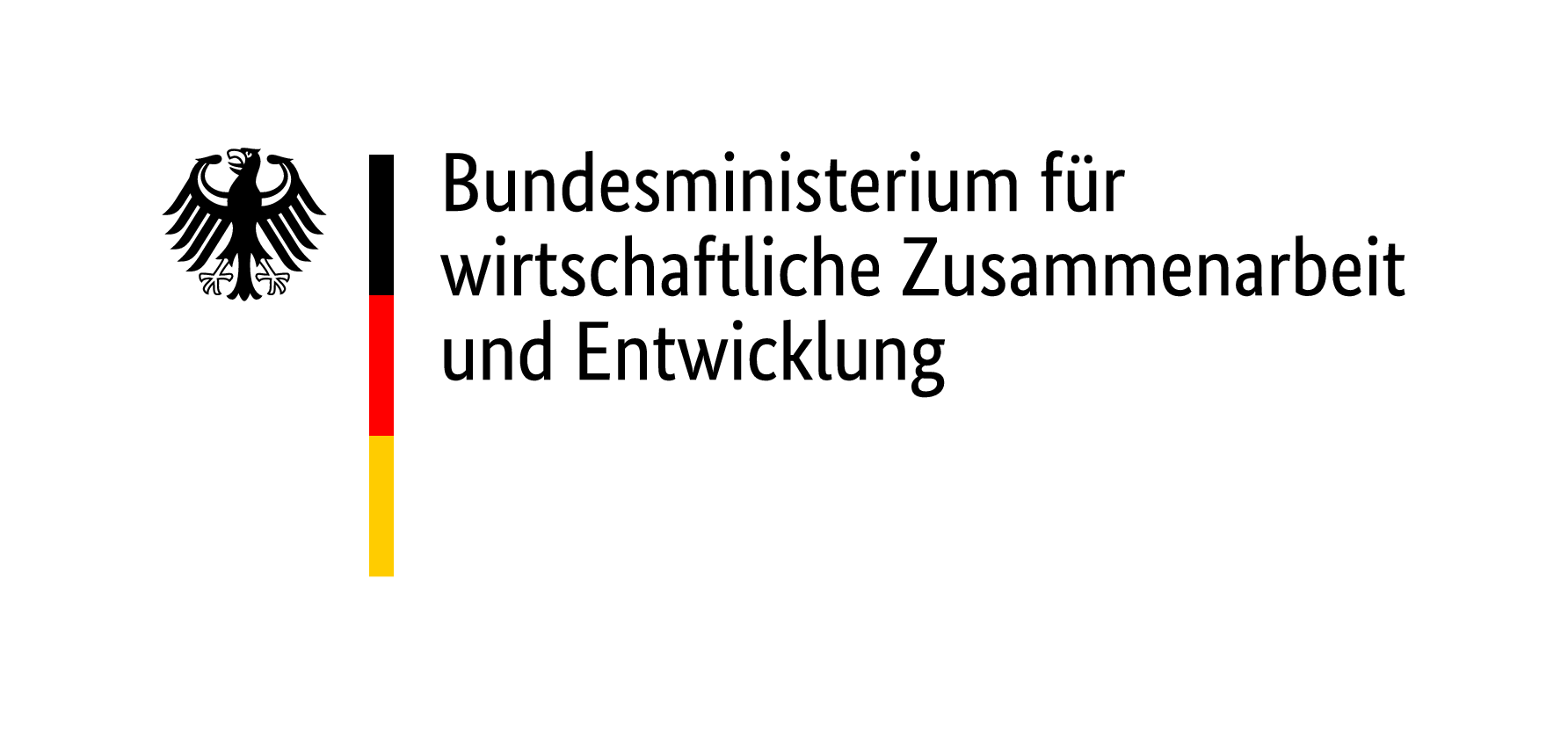As usual in Country in Focus, could you please start with an overview of the current political culture of Kenya?
While Kenya is not an advanced democracy, in my observation it is a democracy nonetheless, especially compared to our neighbours. Kenya has never had a problem with a handover of power, we now have our fifth president and the power has always been peacefully transitioned.
Also watch our webinar dedicated to Kenya and Africa "Activism in non-democratic contexts":
The current political situation in Kenya is now relatively calm, even though the cost of living has made the opposition to be active. We are just less than two years away from the last election and our current president and his government have only been in office for one and a half years. Last year was a very hectic one with demonstrations called by the opposition, but towards the end of the year, things have calmed. Civil society is playing a big role as the watchdog of the government.
We for sure have our own issues. Tribalism and division by ethnicity is a big issue in Kenya, it overshadows very many other things. Even when we speak about civil society, leaders may side with a government that is from their community. For example, let’s say I am a lawyer, and if the president is from my community or a community that is friendly to mine, I will be friendly towards that government. If the leadership of the government is from a rival tribe, most likely we will the community will go to the streets protesting. Right now this government and the civil society are in peace.
What can you say about direct democracy in Kenya?
Direct democracy in Kenya is not so much entrenched. There is no direct way for Kenyans to influence the government’s decision when signing any international treaty, for example. We have very few available tools, for instance, a right to recall was introduced in 2010.
However, from 2010 to now 2024, in those 14 years, the recall in Kenya has never been applied even once. It is very difficult to recall a Member of Parliament or a Senator because they cannot be recalled in their first two years in the office and at the same time it is impossible to recall someone who has less than one year to serve in the office. Our officials are elected for a five-year term, so the window of opportunities for the recall is very limited. Additionally, recalling someone requires a collection of signatures which in practice is very difficult in Kenya. Recall only applies to Members of Parliament and Members of the County Assemblies in the county, so there is no recall for Governors or their deputies.
The instrument that was so far quite active is the petitioning. There were 19 petitions to the Parliament to act on something, like removing a certain judge who is corrupt from the court or removing a public official from office who is not acting in the public’s best interest. That we are doing.
We do have citizens’ initiative, meaning the citizens are able to launch a popular initiative by themselves, but so far none has ever been successful. This tool is only available on the national level, so citizens’ initiatives cannot be launched on a regional level. This is why none has ever been successful because the organisers have to travel around the entire country even if the issue they want to bring up is related to their own district. The signature threshold is one million signatures to submit the initiative to the electoral body. There is only one initiative that reached this number of signatures in 2019. This initiative proposal was taken to the county assemblies but the majority of them rejected it.
What other forms of citizen participation are in Kenya and what is the situation for civil society?
There are no limitations in terms of citizen participation, everyone can participate in any forum or gathering, everyone is allowed to vote even those in prison, and people can even contest as independent candidates in elections. Everyone is free to become a member of any party, anyone is free to be part of the opposition. It is progress, as years back under the government of Moi, one was only supposed to support the government and it was almost a crime to be a member of the opposition.
As you mentioned, Kenya is still divided by ethnicity. What do you think about the potential of direct democracy use in divided societies in general and in Kenya in particular?
I believe that direct democracy can’t be used effectively as long as the leadership of the different ethnic groups or the different tribes are divided. If the leader of tribe A and the leader of tribe B come together and agree on something, only then the agreement will work for the benefit of the country. As long as the different tribes are in disharmony then direct democracy can't work.
Some instruments may be misused in such cases. For example, the opposition coalition in 2016, CORD fronted the Okoa Kenya initiative that in reality only aimed at crippling the then government – the initiative sought to increase cash allocations to communities from 15% to 45%. In reality even today the national government struggles to allocate 15% to the counties! Another presented idea of creating a ward fund in all counties to be managed by Members of County Assembles (MCAs) has not been easy to implement in any county over the past 10 years. Lastly, the Okoa Kenya Initiative wanted to restructure the Independent Elections & Boundaries Commission (IEBC) in such a way that it is headed by commissioners chosen by political parties. If this was to happen, how then could they be neutral or impartial in their work?
These are some on the recommendations of the failed Okoa Kenya Initiative. It illustrates that it was not so much that they wanted to change anything, they just wanted to disrupt the government led by a representative of another community. Since in Kenya there is no possibility for a regional referendum and a country-wide referendum is a very expensive exercise, this was tribal leaders of one community just wanting to bring a referendum to destabilise the government of the rivals.
Since Kenya's independence, constitutional reforms have been a big topic in the country. Could you give an overview of the process?
Constitutional reforms in Kenya have always been a big topic because, in 1963 when Kenya became independent from the United Kingdom, we inherited the colonialist constitution. It was only slightly amended but remained generally very colonial. The president from 1963 was using powers that the queen had and was misusing those powers.
By 2002 the fight for the reform of the constitution had matured, and Kenya got a new president who promised that he would give a new constitution. In 2005 he actually had prepared a new draft of a constitution that citizens were to vote on, but Kenyans rejected that version of the constitution.
In 2010 we accepted the new constitution which passed the vote because it brought a lot of changes with it. Kenya got a new judiciary with the Supreme Court, a bicameral Parliament that consists of the Senate and the National Assembly. The constitutional update brought in women's representation and the possibility to run for office as an independent.
The 2021 attempt to amend the constitution was the Building Bridges Initiative. It was proposed in 2019 by former President Uhuru Kenyatta to reform the constitution with the help of the Presidential Taskforce. The President in 2020 introduced the Bill to the parliament but later moved towards the change of the constitution by popular initiative. He was the force behind the collection of one million signatures required for that. The referendum was planned for 2021 and approved by 30 out of 47 county assemblies but never happened as the High Court of Kenya ruled it to be unconstitutional. Later after many court hearings, the Supreme Court of Kenya in 2022 ruled that the amendments were not constitutional. Now that we have a new government that chapter was closed because the person who was fighting against the changes is the person who is the president now.
Lastly, what do you think are the main challenges of civil society?
Allow me to take you a bit back to the 1990s. In the 1992 election Kenyans trusted the civil society because the government was corrupt and dictatorial. Issue of Human Rights, equality and many more good developments were advanced by the civil society. In 2002 when we removed the ruling party that ruled Kenya from 1963 to 2002, the new government of Mwai Kibaki came into the office with the support of the civil society. Most of the civil society leaders became part of that government as cabinet ministers or principal secretaries, and it was largely a government that was not very different from the civil society itself.
The problem now is the tribalism in Kenya, as the civil society leaders started seeing things solely from the angle of their tribe. Hence, the confidence of Kenyans in Civil Society is reduced because now transparency, accountability, equality and all the values the civil society carries are overshadowed by tribalism.
Now civil society does play certain role, but there's a diminished trust towards the civil society. Today the government is supported by civil society organisations that are led by the people from the tribe of the president.
This article was written in connection with the Life as an activist project. Five countries, five democracy activists, five mini-documentaries! The following video is the Life as an activist project documentary.
Mini Documentary - Diffe explains the realities and challenges of democracy activism in Kenya. This documentary is part of the Life as an activist project, which this article supports.



